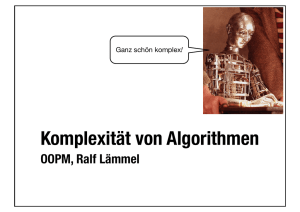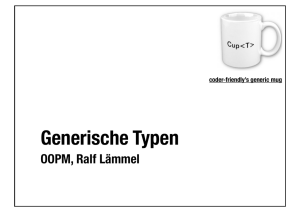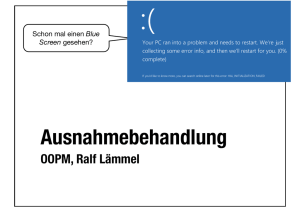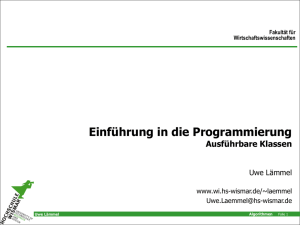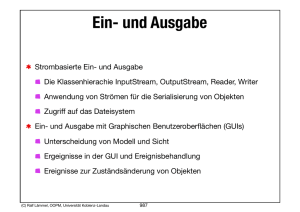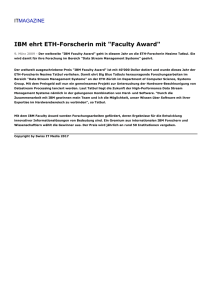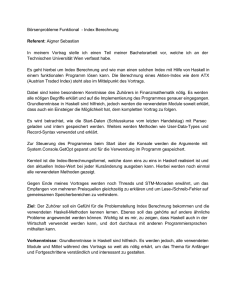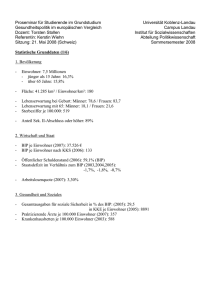Ralf Lämmel, 2015, Software Languages Team, Faculty of Computer
Werbung
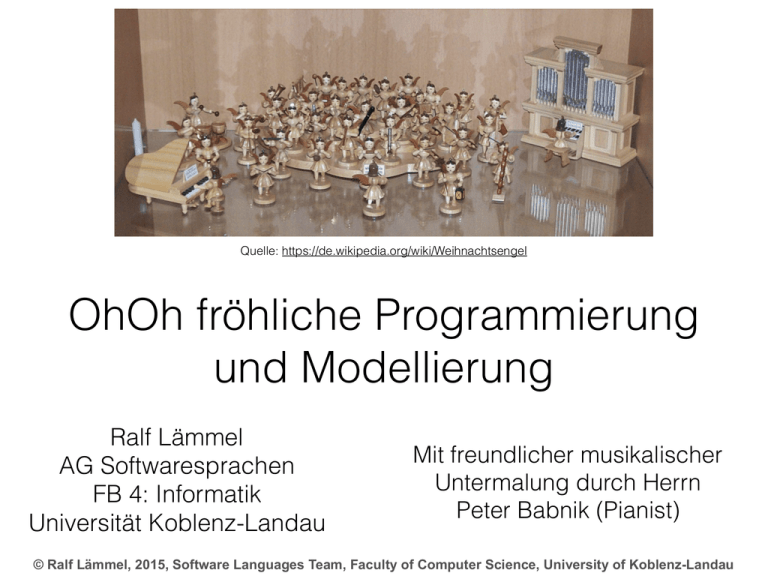
Quelle: https://de.wikipedia.org/wiki/Weihnachtsengel
OhOh fröhliche Programmierung
und Modellierung
Ralf Lämmel
AG Softwaresprachen
FB 4: Informatik
Universität Koblenz-Landau
Mit freundlicher musikalischer
Untermalung durch Herrn
Peter Babnik (Pianist)
© Ralf Lämmel, 2015, Software Languages Team, Faculty of Computer Science, University of Koblenz-Landau
Gemeinsames Singen:
Last Christmas — WHAM!
Quelle: http://en.wikipedia.org/wiki/Last_Christmas
© Ralf Lämmel, 2015, Software Languages Team, Faculty of Computer Science, University of Koblenz-Landau
Santa Claus Is Coming to Town
You better watch out
You better not cry
Better not pout
I'm telling you why
Santa Claus is coming to town
He's making a list
And checking it twice
Gonna find out Who's naughty and nice
Santa Claus is coming to town
He sees you when you're sleeping
He knows when you're awake
He knows if you've been bad or good
So be good for goodness sake!
O! You better watch out!
You better not cry
Better not pout
I'm telling you why
Santa Claus is coming to town
Santa Claus is coming to town
© Ralf Lämmel, 2015, Software Languages Team, Faculty of Computer Science, University of Koblenz-Landau
Ein Quizz zum
Aufwärmen
© Ralf Lämmel, 2015, Software Languages Team, Faculty of Computer Science, University of Koblenz-Landau
Was ist das?
© Ralf Lämmel, 2015, Software Languages Team, Faculty of Computer Science, University of Koblenz-Landau
Was ist das?
Mein Mathelehrer: “Ein Stück Butter.”
© Ralf Lämmel, 2015, Software Languages Team, Faculty of Computer Science, University of Koblenz-Landau
Was ist das?
© Ralf Lämmel, 2015, Software Languages Team, Faculty of Computer Science, University of Koblenz-Landau
Was ist das?
In DDR-Zeiten konnten weder
“Christ-” noch “Weihnachts”Bäume zugelassen werden und so
wurde dem Christbaum einfach eine
passende Geschichte und ein neuer
Name - “Schmuckbaum” gegeben.
Man erklärte seine Vergangenheit
als Festbaum der Zünfte, der zum
Kinderbaum geworden sei. Eben
deshalb habe ihn die Sowjetunion
1935 zu Silvester als
“Gabenbaum” eingeführt.
Quelle: https://de.wikipedia.org/wiki/Weihnachtsbaum
Quelle: http://de.alt.folklore.ddr.narkive.com/HKoKUWgF/zitiertweihnachtsbaum-in-der-ddr
© Ralf Lämmel, 2015, Software Languages Team, Faculty of Computer Science, University of Koblenz-Landau
Was ist das?
© Ralf Lämmel, 2015, Software Languages Team, Faculty of Computer Science, University of Koblenz-Landau
Was ist das?
Jahresendflügelfigur soll ein offizieller
Begriff für Weihnachtsengel der DDR
gewesen sein. In einigen Gegenden
kursierten auch die Begriffe geflügelte
Jahresendfigur, Jahresendflügelpuppe und
Jahresendflügelwesen. Außerdem sind die
Varianten Jahresendfigur m. F. (mit
Flügeln), Jahresendfigur o. F. (ohne Flügel
– Weihnachtsmann, Bergmann etc.),
Jahresendemann und weitere Varianten
bekannt. Die Schöpfung des Begriffs wird
manchmal der einzigen in der DDR
verlegten Satirezeitschrift Eulenspiegel
zugeschrieben.
Quelle: https://de.wikipedia.org/wiki/Weihnachtsengel
Quelle: https://de.wikipedia.org/wiki/
Jahresendfl%C3%BCgelfigur
© Ralf Lämmel, 2015, Software Languages Team, Faculty of Computer Science, University of Koblenz-Landau
Was macht das?
public static void accountStatement(int lines) {
for (int i = 0; i < lines; i++) {
for (int a = 0; a < lines-i-1; a++)
System.out.print(" ");
for (int y = 0; y < i*2 + 1; y++)
System.out.print("x");
System.out.println();
}
}
© Ralf Lämmel, 2015, Software Languages Team, Faculty of Computer Science, University of Koblenz-Landau
Was macht das?
x
public static void accountStatement(int lines) {
for (int i = 0; i < lines; i++) {
xxx
for (int a = 0; a < lines-i-1; a++)
xxxxx
System.out.print(" ");
xxxxxxx
for (int y = 0; y < i*2 + 1; y++)
System.out.print("x");
xxxxxxxxx
System.out.println();
xxxxxxxxxxx
}
}
xxxxxxxxxxxxx
Quelle: http://stackoverflow.com/questions/21171316/
drawing-an-ascii-tree-using-nested-for-loops
© Ralf Lämmel, 2015, Software Languages Team, Faculty of Computer Science, University of Koblenz-Landau
Was macht das?
m(f,a,s)char*s;
{char c;return f&1?a!=*s++?m(f,a,s):s[11]:f&2?a!=*s++?1+m(f,a,s):1:f&4?a--?
putchar(*s),m(f,a,s):a:f&8?*s?m(8,32,(c=m(1,*s++,"Arjan Kenter. \no$../.\""),
m(4,m(2,*s++,"POCnWAUvBVxRsoqatKJurgXYyDQbzhLwkNjdMTGeIScHFmpliZEf"),&c),s)):
65:(m(8,34,"rgeQjPruaOnDaPeWrAaPnPrCnOrPaPnPjPrCaPrPnPrPaOrvaPndeOrAnOrPnOrP\
nOaPnPjPaOrPnPrPnPrPtPnPrAaPnBrnnsrnnBaPeOrCnPrOnCaPnOaPnPjPtPnAaPnPrPnPrCaPn\
BrAnxrAnVePrCnBjPrOnvrCnxrAnxrAnsrOnvjPrOnUrOnornnsrnnorOtCnCjPrCtPnCrnnirWtP\
nCjPrCaPnOtPrCnErAnOjPrOnvtPnnrCnNrnnRePjPrPtnrUnnrntPnbtPrAaPnCrnnOrPjPrRtPn\
CaPrWtCnKtPnOtPrBnCjPronCaPrVtPnOtOnAtnrxaPnCjPrqnnaPrtaOrsaPnCtPjPratPnnaPrA\
aPnAaPtPnnaPrvaPnnjPrKtPnWaOrWtOnnaPnWaPrCaPnntOjPrrtOnWanrOtPnCaPnBtCjPrYtOn\
UaOrPnVjPrwtnnxjPrMnBjPrTnUjP"),0);}
main(){return m(0,75,"mIWltouQJGsBniKYvTxODAfbUcFzSpMwNCHEgrdLaPkyVRjXeqZh");}
© Ralf Lämmel, 2015, Software Languages Team, Faculty of Computer Science, University of Koblenz-Landau
Was macht das?
m(f,a,s)char*s;
{char c;return f&1?a!=*s++?m(f,a,s):s[11]:f&2?a!=*s++?1+m(f,a,s):1:f&4?a--?
putchar(*s),m(f,a,s):a:f&8?*s?m(8,32,(c=m(1,*s++,"Arjan Kenter. \no$../.\""),
m(4,m(2,*s++,"POCnWAUvBVxRsoqatKJurgXYyDQbzhLwkNjdMTGeIScHFmpliZEf"),&c),s)):
65:(m(8,34,"rgeQjPruaOnDaPeWrAaPnPrCnOrPaPnPjPrCaPrPnPrPaOrvaPndeOrAnOrPnOrP\
nOaPnPjPaOrPnPrPnPrPtPnPrAaPnBrnnsrnnBaPeOrCnPrOnCaPnOaPnPjPtPnAaPnPrPnPrCaPn\
BrAnxrAnVePrCnBjPrOnvrCnxrAnxrAnsrOnvjPrOnUrOnornnsrnnorOtCnCjPrCtPnCrnnirWtP\
nCjPrCaPnOtPrCnErAnOjPrOnvtPnnrCnNrnnRePjPrPtnrUnnrntPnbtPrAaPnCrnnOrPjPrRtPn\
CaPrWtCnKtPnOtPrBnCjPronCaPrVtPnOtOnAtnrxaPnCjPrqnnaPrtaOrsaPnCtPjPratPnnaPrA\
aPnAaPtPnnaPrvaPnnjPrKtPnWaOrWtOnnaPnWaPrCaPnntOjPrrtOnWanrOtPnCaPnBtCjPrYtOn\
UaOrPnVjPrwtnnxjPrMnBjPrTnUjP"),0);}
main(){return m(0,75,"mIWltouQJGsBniKYvTxODAfbUcFzSpMwNCHEgrdLaPkyVRjXeqZh");}
Quelle: https://www.cise.ufl.edu/~manuel/obfuscate/smile.c
© Ralf Lämmel, 2015, Software Languages Team, Faculty of Computer Science, University of Koblenz-Landau
Was macht das?
… und wieso geht das?
public static String sin(float w) {
List l = new LinkedList();
while (w >= -3) {
l.add((int)w);
w -= 1;
}
float r = 1;
for (Object o : l) {
float f = Math.max(Math.abs((int)o), 1);
r *= f;
}
return new Float(r/6).toString();
}
© Ralf Lämmel, 2015, Software Languages Team, Faculty of Computer Science, University of Koblenz-Landau
Was macht das?
… und wieso geht das?
public static String sin(float w) {
List l = new LinkedList();
while (w >= -3) {
l.add((int)w);
w -= 1;
}
float r = 1;
for (Object o : l) {
float f = Math.max(Math.abs((int)o), 1);
r *= f;
}
return new Float(r/6).toString();
}
Der Sinus von 5 ist 120.
© Ralf Lämmel, 2015, Software Languages Team, Faculty of Computer Science, University of Koblenz-Landau
Winter Wonderland
Sleigh bells ring, are you listening,
In the lane, snow is glistening
A beautiful sight,
We're happy tonight.
Walking in a winter wonderland.
Gone away is the bluebird,
Here to stay is a new bird
He sings a love song,
As we go along,
Walking in a winter wonderland.
In the meadow we can build a snowman,
Then pretend that he is Parson Brown
He'll say: Are you married?
We'll say: No man,
But you can do the job
When you're in town.
...
© Ralf Lämmel, 2015, Software Languages Team, Faculty of Computer Science, University of Koblenz-Landau
Warum kompiliert das?
Quelle: https://www.quora.com/What-are-some-cool-Java-codes-whose-output-is-weird-but-correct
© Ralf Lämmel, 2015, Software Languages Team, Faculty of Computer Science, University of Koblenz-Landau
Was ist die Ausgabe?
Random random = new Random(441287210);
for (int i = 0; i < 10; i++)
System.out.print(random.nextInt(10) + " ");
© Ralf Lämmel, 2015, Software Languages Team, Faculty of Computer Science, University of Koblenz-Landau
Was ist die Ausgabe?
Random random = new Random(441287210);
for (int i = 0; i < 10; i++)
System.out.print(random.nextInt(10) + " ");
1 1 1 1 1 1 1 1 1 1
Quelle:
http://www.javacodegeeks.com/2011/10/weird-funny-java.html
© Ralf Lämmel, 2015, Software Languages Team, Faculty of Computer Science, University of Koblenz-Landau
Was ist die Ausgabe?
int i = (byte) + (char) - (int) + (long) - 1;
System.out.println(i);
© Ralf Lämmel, 2015, Software Languages Team, Faculty of Computer Science, University of Koblenz-Landau
Was ist die Ausgabe?
int i = (byte) + (char) - (int) + (long) - 1;
System.out.println(i);
1
Quelle:
http://www.javacodegeeks.com/2011/10/weird-funny-java.html
© Ralf Lämmel, 2015, Software Languages Team, Faculty of Computer Science, University of Koblenz-Landau
Let it Snow
Oh the weather outside is frightful,
But the fire is so delightful,
And since we've no place to go,
Let It Snow! Let It Snow! Let It Snow!
It doesn't show signs of stopping,
And I've bought some corn for popping,
The lights are turned way down low,
Let It Snow! Let It Snow! Let It Snow!
When we finally kiss goodnight,
How I'll hate going out in the storm!
But if you'll really hold me tight,
All the way home I'll be warm.
The fire is slowly dying,
And, my dear, we're still good-bying,
But as long as you love me so,
Let It Snow! Let It Snow! Let It Snow!
© Ralf Lämmel, 2015, Software Languages Team, Faculty of Computer Science, University of Koblenz-Landau
Heutiges Vorlesungsthema:
Chrestomathien
© Ralf Lämmel, 2015, Software Languages Team, Faculty of Computer Science, University of Koblenz-Landau
Basisdemokratie
•
Was ist eine Chrestomathie?
•
Eine seltene (Geschlechts)krankheit
•
Eine ausgefallene Süßspeise
© Ralf Lämmel, 2015, Software Languages Team, Faculty of Computer Science, University of Koblenz-Landau
https://de.wikipedia.org/wiki/
Chrestomathie
© Ralf Lämmel, 2015, Software Languages Team, Faculty of Computer Science, University of Koblenz-Landau
Programmchrestomathien
•
Hello World: http://www.roesler-ac.de/wolfram/hello.htm
•
99 bottles of beer: http://99-bottles-of-beer.net/
•
Factorial: http://www.willamette.edu/~fruehr/haskell/evolution.html
•
Fibonacci sequence: http://cubbi.com/fibonacci.html
•
OO shapes: http://www.angelfire.com/tx4/cus/shapes/
•
Literate programs: http://en.literateprograms.org/
•
Rosetta Code: http://rosettacode.org/
•
101companies: http://101companies.org/
Siehe auch http://rosettacode.org/wiki/Help:Similar_Sites
© Ralf Lämmel, 2015, Software Languages Team, Faculty of Computer Science, University of Koblenz-Landau
Hello World
http://www.roesler-ac.de/wolfram/hello.htm
© Ralf Lämmel, 2015, Software Languages Team, Faculty of Computer Science, University of Koblenz-Landau
99 bottles of beer
© Ralf Lämmel, 2015, Software Languages Team, Faculty of Computer Science, University of Koblenz-Landau
A Java version
http://www.99-bottles-of-beer.net/language-java-4.html?
PHPSESSID=32269dee0fedac31dc90739c31ab45f9
class bottles {
public static void main(String args[]) {
String s = "s";
for (int beers=99; beers>-1;) {
System.out.print(beers + " bottle" + s + " of beer on the wall, ");
System.out.println(beers + " bottle" + s + " of beer, ");
if (beers==0) {
System.out.print("Go to the store, buy some more, ");
System.out.println("99 bottles of beer on the wall.\n");
System.exit(0);
} else
System.out.print("Take one down, pass it around, ");
s = (--beers == 1) ? "" : "s";
System.out.println(beers + " bottle" + s + " of beer on the wall.\n");
}
}
}
© Ralf Lämmel, 2015, Software Languages Team, Faculty of Computer Science, University of Koblenz-Landau
The evolution of a Haskell programmer
http://www.willamette.edu/~fruehr/haskell/evolution.html
Implementationen der Fakultätsfunktion
Freshman Haskell programmer
Sophomore Haskell programmer, at MIT
Continuation-passing Haskell programmer
Junior Haskell programmer
Boy Scout Haskell programmer
Senior Haskell programmer
Combinatory Haskell programmer
Memoizing Haskell programmer
List-encoding Haskell programmer
Pointless Haskell programmer
Interpretive Haskell programmer
Iterative Haskell programmer
...
Accumulating Haskell programmer
© Ralf Lämmel, 2015, Software Languages Team, Faculty of Computer Science, University of Koblenz-Landau
Freshman Haskell programmer
http://www.willamette.edu/~fruehr/haskell/evolution.html
fac n = if n == 0
then 1
else n * fac (n-1)
© Ralf Lämmel, 2015, Software Languages Team, Faculty of Computer Science, University of Koblenz-Landau
Die NOP-Chrestomathie
Ralfs to
llste Er
findung
© Ralf Lämmel, 2015, Software Languages Team, Faculty of Computer Science, University of Koblenz-Landau
[http://en.wikipedia.org/wiki/NOP, 16 December 2012]
© Ralf Lämmel, 2015, Software Languages Team, Faculty of Computer Science, University of Koblenz-Landau
NOP in Java
$ more Program.java
class Program {
public static void main(String[] args) {
}
}
$ javac Program.java
$ java Program
$
© Ralf Lämmel, 2015, Software Languages Team, Faculty of Computer Science, University of Koblenz-Landau
Quizz: Was ist die Länge des
kürzesten NOP-Programmes?
•
a) 42 Zeichen
•
b) 11 Zeichen
•
c) 7 Zeichen
© Ralf Lämmel, 2015, Software Languages Team, Faculty of Computer Science, University of Koblenz-Landau
NOP in C (with GCC)
$ more Program.c
main()
{
}
$ gcc Program.c
For what matters,
this program may
return a non-zero
return code.
$ ./a.out
$
© Ralf Lämmel, 2015, Software Languages Team, Faculty of Computer Science, University of Koblenz-Landau
NOP in Haskell (with GHC)
$ more Program.hs
main = do return ()
$ ghc -v0 Program.hs
$ ./Program
$
© Ralf Lämmel, 2015, Software Languages Team, Faculty of Computer Science, University of Koblenz-Landau
NOP in Python (interpreted)
$ more Program.py
$ python Program.py
$
© Ralf Lämmel, 2015, Software Languages Team, Faculty of Computer Science, University of Koblenz-Landau
NOP in Python (scripted)
$ more Program.py
#! /usr/bin/env python
$ ./Program.py
$
© Ralf Lämmel, 2015, Software Languages Team, Faculty of Computer Science, University of Koblenz-Landau
Was lernen wir daraus?
•
Java ist eine Klassen-orientierte Programmiersprache.
•
C ist eine prozedurale Programmiersprache.
•
Haskell ist eine funktionale Programmiersprache.
•
Python ist eine Scriptingsprache.
© Ralf Lämmel, 2015, Software Languages Team, Faculty of Computer Science, University of Koblenz-Landau
Was lernen wir noch?
•
Java ist eine compilierte Sprache.
•
C ist auch eine compilierte Sprache.
•
Haskell ist auch eine compilierte Sprache.
•
Python ist eine interpretierte Sprache.
© Ralf Lämmel, 2015, Software Languages Team, Faculty of Computer Science, University of Koblenz-Landau
Rudolph, The Red Nosed Reindeer
Rudolph, the red-nosed reindeer
had a very shiny nose.
And if you ever saw him,
you would even say it glows.
All of the other reindeer
used to laugh and call him names.
They never let poor Rudolph
join in any reindeer games.
Then one foggy Christmas Eve
Santa came to say:
"Rudolph with your nose so bright,
won't you guide my sleigh tonight?"
Then all the reindeer loved him
as they shouted out with glee,
Rudolph the red-nosed reindeer,
you'll go down in history!
© Ralf Lämmel, 2015, Software Languages Team, Faculty of Computer Science, University of Koblenz-Landau
Die Shapes-Chrestomathie
© Ralf Lämmel, 2015, Software Languages Team, Faculty of Computer Science, University of Koblenz-Landau
Die Shapes-Chrestomathie
•
Es gibt verschiedene Formen: Kreise, Rechtecke, usw.
•
Es gibt eine polymorphe Methode draw zum Malen.
•
Es gibt mit verschiedenen Formen gefüllte Container.
•
Welche Programmentwürfe sind möglich?
•
Wie behandelt man Quadrate?
http://w
Siehe a
uch
ww.ang
elfire.c
om/tx4
/cus/sh
apes/
© Ralf Lämmel, 2015, Software Languages Team, Faculty of Computer Science, University of Koblenz-Landau
Mitglieder der Shapes-Chrestomathie
(Ralfs Version — Es gibt andere Sammlungen.)
•
classy
class Shape + class …
•
interfacy
interface Shape + class …
•
enumy
1 class + 1 enum type
•
classy.withSquares.sibling
Square extends Shape
•
classy.withSquares.sup
Rectangle extends Square
•
classy.withSquares.sub
Square extends Rectangle
© Ralf Lämmel, 2015, Software Languages Team, Faculty of Computer Science, University of Koblenz-Landau
Demo: 120-minütige
Besprechung der ShapesBeispiele in Eclipse
© Ralf Lämmel, 2015, Software Languages Team, Faculty of Computer Science, University of Koblenz-Landau
Jingle Bells
Dashing through the snow
In a one-horse open sleigh
O'er the fields we go
Laughing all the way
Bells on bobtail ring
Making spirits bright
What fun it is to ride and sing
A sleighing song tonight!
Jingle bells, jingle bells,
Jingle all the way.
Oh! what fun it is to ride
In a one-horse open sleigh.
© Ralf Lämmel, 2015, Software Languages Team, Faculty of Computer Science, University of Koblenz-Landau
Frohe Weihnachten und
einen guten Rutsch
wünscht das OOPM-Team.
Die Chrestomathien sind online verfügbar:
https://github.com/rlaemmel/nopetal
© Ralf Lämmel, 2015, Software Languages Team, Faculty of Computer Science, University of Koblenz-Landau

